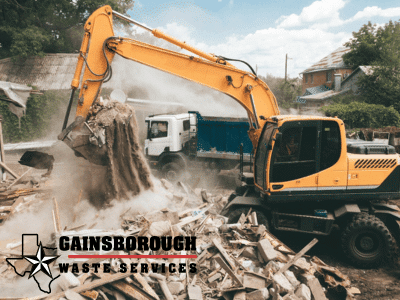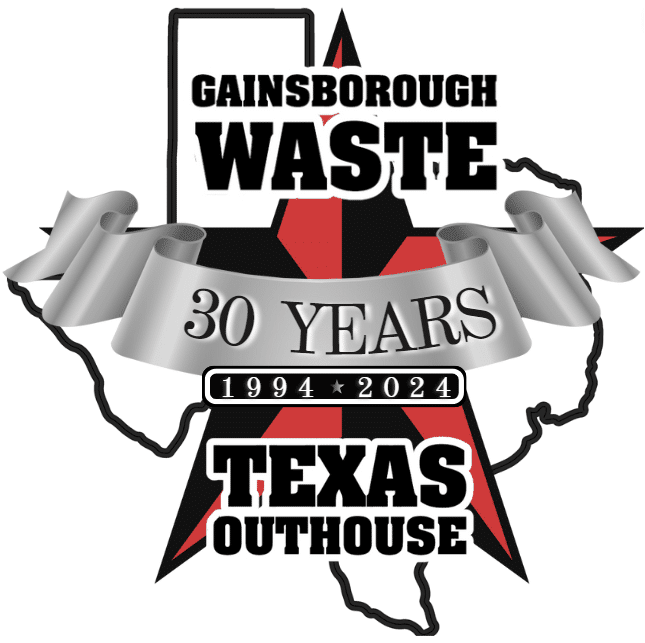Effective waste disposal is crucial for supporting safety at construction sites. With the construction industry generating a tremendous amount of waste, we recommend that site managers have a robust waste plan in place for each job site.
Learn why having a comprehensive waste plan is the foundation for effective waste disposal on construction sites. Also, discover the value of working with a local waste service provider like Gainsborough Waste to help you maintain safe job sites in the Greater Houston area.
The Importance of Waste Disposal on Construction Sites
Just like you have a construction plan to support the work to be done, you also want a plan for how to manage waste generated at the job site. Your waste plan should address all aspects of the job site – from identifying types of waste generated during construction and demolition (C&D) to the methods of disposal.
Establishing a detailed plan will ensure that waste is handled safely and efficiently, reducing the amount of unwanted materials that end up in landfills. A plan is especially important to help everyone on the job site understand how to dispose of various types of waste.
Types of Waste Generated on Construction Sites
Construction sites generate various types of waste. We recommend outlining the types of waste that crew members may encounter at the job site so they know how to dispose of the materials. A sample of waste to reference in your plan may include the following:
- Concrete and Masonry: This includes leftover concrete, bricks, and masonry blocks, which are often generated during demolition.
- Wood Waste: Excess lumber, pallets, and wood scraps are commonly produced in construction processes and can be repurposed or recycled.
- Metal Waste: Steel, copper, and aluminum remnants are typical in construction sites, especially when dealing with structural frameworks or electrical systems.
- Drywall: Waste from drywall installation and removal can be substantial, requiring effective disposal methods to prevent contamination.
- Packaging Materials: Cardboard, plastic wrap, and other packaging waste are prevalent and often generated from the materials and tools delivered to the site.
- Earth and Soil: Excavation and landscaping activities can result in surplus soil and debris, which must be managed responsibly to avoid environmental impact.
You may also encounter hazardous materials at the job site. Your plan should include specific instructions on how to handle this type of waste to ensure the safety of your crew.
By identifying and categorizing the different types of waste at the job site, construction managers can implement targeted strategies for recycling and proper disposal, ultimately contributing to a more sustainable construction practice.
Strategies to Manage Waste on Construction Sites
To effectively manage the various types of waste generated at construction sites, you will want to outline specific steps and procedures. Adopting best practices can enhance efficiency, promote recycling, and ensure compliance with local construction ordinances in Houston.
Consider our recommended steps to support waste disposal.
1. Reduce Construction Waste
The first step in managing waste is to reduce the amount of waste generated. This can be achieved through the following actions:
- Planning and design: Use accurate measurements and design buildings with waste reduction in mind. Encourage your crew members to follow the industry adage to measure twice and cut once to help reduce waste and scrap.
- Efficient material use: Strive to order the correct materials and use them efficiently to minimize waste and leftovers.
2. Rent Roll-Off Dumpsters from Gainsborough Waste
Managing waste on construction sites can be challenging, but roll-off dumpsters from Gainsborough Waste provide a convenient solution. These waste containers streamline the waste removal process, ensuring a safer and more organized working environment. Here’s what Gainsborough Waste offers:
- Various sizes of roll-off dumpsters: Select from 15 to 40-yard roll-off dumpsters to fit specific project needs.
- Efficient collection and disposal: Create one centralized location for your crew to dispose of multiple waste types.
- Streamlined compliance: We offer a simplified disposal process for mixed waste, ensuring compliance with local regulations
- Site safety and efficiency: Dumpsters help reduce on-site clutter in common work areas, enhancing safety and efficiency.
3. Use a Local Dump Site
Utilizing a designated disposal site like the Gainsborough Waste Dump Site is essential for effective waste disposal on construction sites. Here are some key considerations for proper dump site usage:
- Drop off on your schedule: Schedule regular waste drop-offs at our dump site to maintain cleanliness around the clock at the job site.
- Separate hazardous waste: Separate your waste into hazardous and non-hazardous waste, then bring the non-hazardous waste to our Dump Site. We are an approved TCEQ Type V Disposal Site site for C&D waste.
- Easy sorting: Once you deliver the non-hazardous waste to our Dump Site, we handle the rest with an easy sorting process.
- Recycle materials: We will handle recycling to support sustainable practices for your construction project. Only about 25% of the material that reaches our facility ends up in a landfill, ensuring that the vast majority can be reused materials.
By choosing our Dump Site, construction managers can significantly reduce their environmental footprint, reuse and recycle materials generated at the construction site, and improve operational efficiency.
Benefits of Effective Waste Disposal
Overall, implementing effective waste disposal practices on construction sites creates several benefits for construction site managers. Let’s review how you can benefit from having a plan to manage the waste created during the project:
- Cost Savings: Efficient waste management can lower disposal costs and reduce the need to purchase new materials.
- Enhanced Safety: Proper waste disposal minimizes the risk of accidents and health hazards on construction sites, supporting OSHA compliance.
- Regulatory Compliance: Construction companies can avoid fines and legal penalties by adhering to local waste regulations, keeping the site operational without interruption.
- Environmental Protection: Reducing the amount of waste in landfills helps protect the environment.
- Positive Public Image: Your company’s commitment to sustainable practices can enhance your reputation and ensure alignment with environmentally-friendly project requirements.
Local Waste Services for Houston Construction Sites
For construction site managers in Houston, partnering with a local waste service provider can significantly streamline the waste disposal process. Our waste services are tailored to fit your specific project needs:
- Convenience: Because we are based in Houston, we are readily available to respond to your needs.
- Expertise: We have extensive knowledge of local regulations and best practices for waste disposal in construction.
- Community Support: Partnering with local businesses supports the local economy and fosters community relations.
Implementing a comprehensive waste plan and working with a local waste service provider can make the job site safer and easier to manage. We are prepared to help you reduce the amount of waste generated and safely manage the waste that you do produce.
Are you ready to discuss waste disposal on construction sites in Houston? Learn more about our services and let’s get started on a tailored waste plan today.
Our local customer service team can help you build a plan, schedule roll-off dumpster rentals, and set a time to use our Dump Site. Let us help you keep waste under control throughout the duration of the project.

